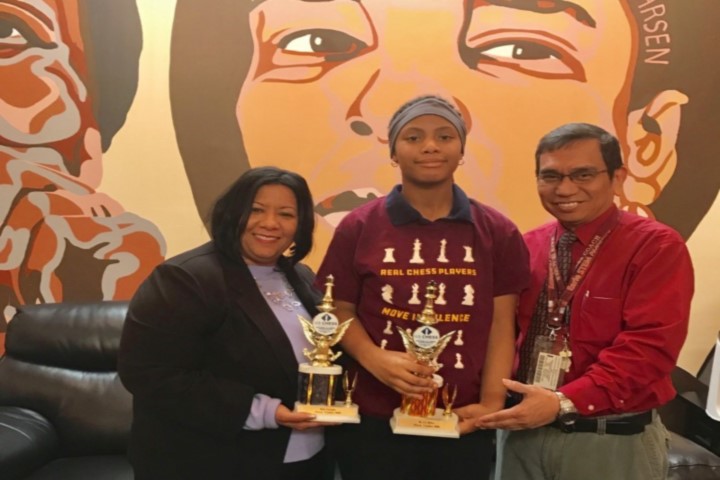Earle STEM Academy student Tamya Fultz started playing chess in sixth grade, and the next year she won Chicago Public Schools’ Academic Chess South Conference Playoffs with a perfect score.


Earle STEM Academy student Tamya Fultz started playing chess in sixth grade, and the next year she won Chicago Public Schools’ Academic Chess South Conference Playoffs with a perfect score.
It was the first time in the history of the school that a seventh-grader took first place at a CPS chess tournament, and it was one of the first of many championships that earned Fultz the nickname “Chess Queen of the South,” said Earle STEM Academy math and chess teacher Joseph Ocol.
Fultz was also the only girl, the only black student, and only student from Chicago Public Schools to place in the 2017 IESA State Chess Finals in Peoria.
As an eighth-grader, Fultz won her divisions in the 2017 National K-12 Chess Tournament in Florida and the Chicago Chess Foundation Chess Tournament in the Windy City, and she’s now looking forward to “bigger” things as she takes her talents to high school.
The recognition for all of her hard work, Fultz said, is rewarding.
“It feels like I accomplished something in life and I did something,” she said in a CPS blog.
Ocol attributes much of Fultz’s success to her character. The teen is an honor roll student with perfect attendance, who also placed in the 98 percentile on standardized tests – “the highest attained by any student at Earle,” the teacher said.
“She’s not just persistent; she’s also tenacious and has the grit to cope with all sorts of challenges,” he said, adding that Fultz now inspires younger students as a team captain. “Everyone wants to follow in the footsteps of Tamya.”
Fultz’s mother, Andrea Smith, told CPS she encourages the youngster to remain humble and respectful, and to step up to embrace her new role.
“I tell her by being captain she’s a bigger influence than the coach sometimes because peers look to each other,” Smith said. “I tell her she’s a leader now.”
The success at Earle STEM Academy is both a testament to Fultz’s strong character and a reflection of what researchers at the Institute for Advanced Studies in Culture refer to as a “moral ecology.”
Scholars James Davison Hunter and Ryan S. Olson describe the relationship in “The Content of Their Character,” an analysis of character education in a wide variety of different schools.
“When social institutions – whether the family, peer relationships, youth organizations, the internet, religious congregations, entertainment, or popular culture – cluster together, they form a larger ecosystem of powerful cultural influences.”
Fultz is not only a product of the moral ecology, but also a respectful, humble, and tenacious role model for younger students.
Loyola Marymount University offers resources for teachers, students and others on “Educating for Intellectual Virtues” – which the website describes as “the deep personal qualities or character strengths of a good thinker or learner.
“Intellectual virtues include qualities like curiosity, attentiveness, open-mindedness, intellectual humility, intellectual autonomy, intellectual courage, and intellectual tenacity,” according to the site.
“Educating for intellectual virtues is not an alternative to instruction in traditional academic subjects like math, English, history, and science. Rather, it is a way of helping students approach and engage with these subjects – a way that is personal, thoughtful, and active.”